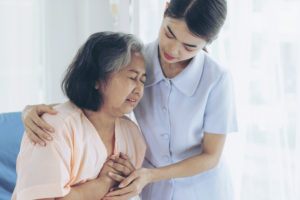
18 Oct 11 Tips for Family Caregivers During the COVID-19 Crisis
Learn how families can be best prepared for caring for senior loved ones by following our tips for providing and planning for care during the coronavirus pandemic.
Family caregivers and their older adult loved ones are facing accelerated challenges from the coronavirus pandemic.
According to a newly released report from the National Alliance for Caregiving and AARP, the number of family caregivers in the United States has already increased 9.5 million from 2015 to 2020, or about one in five Americans.
That number could rise even more as families re-consider long-term care facilities for their loved ones after coronavirus outbreaks in nursing homes across the country.
Seniors and Coronavirus
Older adults are most at risk to develop COVID-19 and its symptoms, which can lead to the development of pneumonia. The elderly should strongly consider getting the pneumonia vaccine regularly. They can also talk to their doctor about the vaccine.
Unfortunately, viruses spread faster in residential facilities, community housing and assisted living centers. When possible, seniors living in these facilities should avoid communal rooms and sanitize often. However, many older adults residing in their own homes have a fair share of risks to manage. If you or your loved one is at risk from the coronavirus, consider our guidance below.
11 tips for successful COVID-19 caregiving
Check all your loved one’s medications.
Take stock of all medications that your loved one is taking. Be sure to reorder any that are running low. During the crisis, talk to the pharmacy about a 90-day supply. Many pharmacies and insurance companies are allowing 90 day prescription refills now. In addition, pharmacy home delivery options are now increasingly available. This will limit the interactions in public that you may have to take, or that of your family members.
Take stock of essentials
It’s important to determine what your loved one has on hand so you can properly plan on what you may need. The uncertainty and evolving nature of the pandemic has created imbalances in different supplies. We are all aware of the recent run on toilet paper, and now meat and other grocery supplies are risking shortages. Inventory how much food, medication, and basic supplies that your loved one has currently. Create a list of what you need. Also, consider how often an item needs replenishment.
A large number of older adults do not keep many extra supplies at hand. They may be on a tight budget, or are accustomed to regular grocery or medication refills. Of course, with their routine upended, we will need to consider a stop gap in the meantime. As available, try to have a minimum supply of water, food, cleaning supplies, and other medical goods for at least two weeks of time.
Compile a list of all medications being taken
Have a regularly updated list of all medications that a family member is currently taking. It is important to include the medication name, strength, dosage, and time that meds are taken. Don’t forget about any vitamins, supplements, or over the counter (OTC) medication that is taken as well. Consider our guide to medication management for more advice and pointers.
Maintain a list of all of your doctors
Compile a list of all of your doctors. This includes your primary care doctor, any specialty doctors, and other providers or overseers of care like physical therapists, care managers, or chiropractors. Be sure to include their contact information. Have it on you and available at all times, when possible. This is in the event of a hospitalization, or to share among your providers that you see regularly to ensure that they can keep in contact with each other, as necessary.
Reschedule any appointments or take them virtually
Review what upcoming visits are currently scheduled or coming due. Consider what can be canceled that is not fully essential. Since health care settings are where the majority of sick people are, it is a good way to minimize your risk. Many providers are turning to telehealth as an option. With this becoming an increasingly viable option, consider taking advantage of it when it makes sense for you or your loved one. Best of all, many insurance companies are covering these visits, at least for the time being.
Have a medical alert card handy.
Medical alert information cards aid in communicating information regarding your health and medical history, allergies, medications, emergency contacts, insurance, and doctor(s). Keep it with you at all times.
Make it a community effort
There may be one primary family caregiver for your loved one. With school out, you may have to juggle your children at home in addition to providing care to a loved one. Plus, your loved one might need extra effort to ensure that they stay safe and remain at home. Try to identify other family members, neighbors, or friends who can check in or assist with shopping or other errands. It’s vital that the person you are caring for doesn’t leave the home and avoids public spaces.
Compile a list of contact information with friends, family, and community services that can assist you to carry out key caregiving tasks.
Know the Pennsylvania community response plan
Stay updated with Pennsylvania state’s emergency management plan available here.
Understand what local resources may be available.
During these challenging times, many organizations, government groups, and communities have stepped up with added support during these tough times. They are constantly evolving and updating them. The Philadelphia Corporation for Aging (PCA) has on their website a regularly updated list for local resources in and around Philadelphia.
Stay connected now more than ever
With ongoing quarantine measures and social distancing guidelines, isolation will impact many older adults. While virtual connection or chatting through a window won’t replace emotional bonds of being face to face and hugging loved ones, there are ways to help promote these connections. To facilitate strong connections for your loved one, set up communication with different and almost always free technologies. Facebook Messenger, FaceTime, WhatApp, or Skype all offer simple and easy to use tools to video chat. Smart speakers are another example, and of course don’t forget phone and text. Utilize them to stay connected with your community and caregiving team too, along with your older loved ones and family members. Our comprehensive guide on engaging seniors to help them avoid social isolation and loneliness is a great tool for caregivers as well.
Ensure your own personal safety and care
Your loved one is very likely to be at high risk to COVID-19 infection. To combat the spread of Coronavirus, minimize physical contact with others as much as possible. Stay home whenever you can. That way, you lower your own risk of infection (and ultimately your loved one that you care for). Continue to follow guidelines from the CDC. With states and establishments slowly reopening, don’t forget to not let your guard down for those that are vulnerable. Plus, you are likely very focused on the person you’re caring for, which is great. However, it’s vital to also care for yourself.
For high-risk individuals, like those with dementia, Alzheimers, or underlying health conditions like heart disease or cancer, you may need to take even more cautious measures. Consider having the primary caregiver isolate with the loved one receiving care, when possible. Next, work to have a back-up plan if the primary caregiver becomes sick or ill. That way you have a plan in place in case an emergent situation arises. This is ideal that way you are not caught off guard without alternative options.
Looking forward
For those that care for a loved one at home, they’re often juggling caregiving with extensive other commitments, including their own family. However, as the pandemic drags on indefinitely, now is the time to review your loved one’s care situation to ensure a safe environment that’s also supportive. This may be a good time to settle down and spend some quality time with your loved one and family. Plus, by properly preparing, you can have some peace of mind by having a plan in place that you can execute should the need arise.
For families that are stretched thin, consider formal home care services like those with Chosen Family Home Care. The best home care agencies have contingency plans for emergent situations like the coronavirus. Chosen Family can implement strong support through its compassionate caregivers and the clients receiving supportive care. They have strict protocols for safety during this period as well. Be sure to check out all of our regular senior blog posts with great resources for caregivers and loved ones.






1 Comment